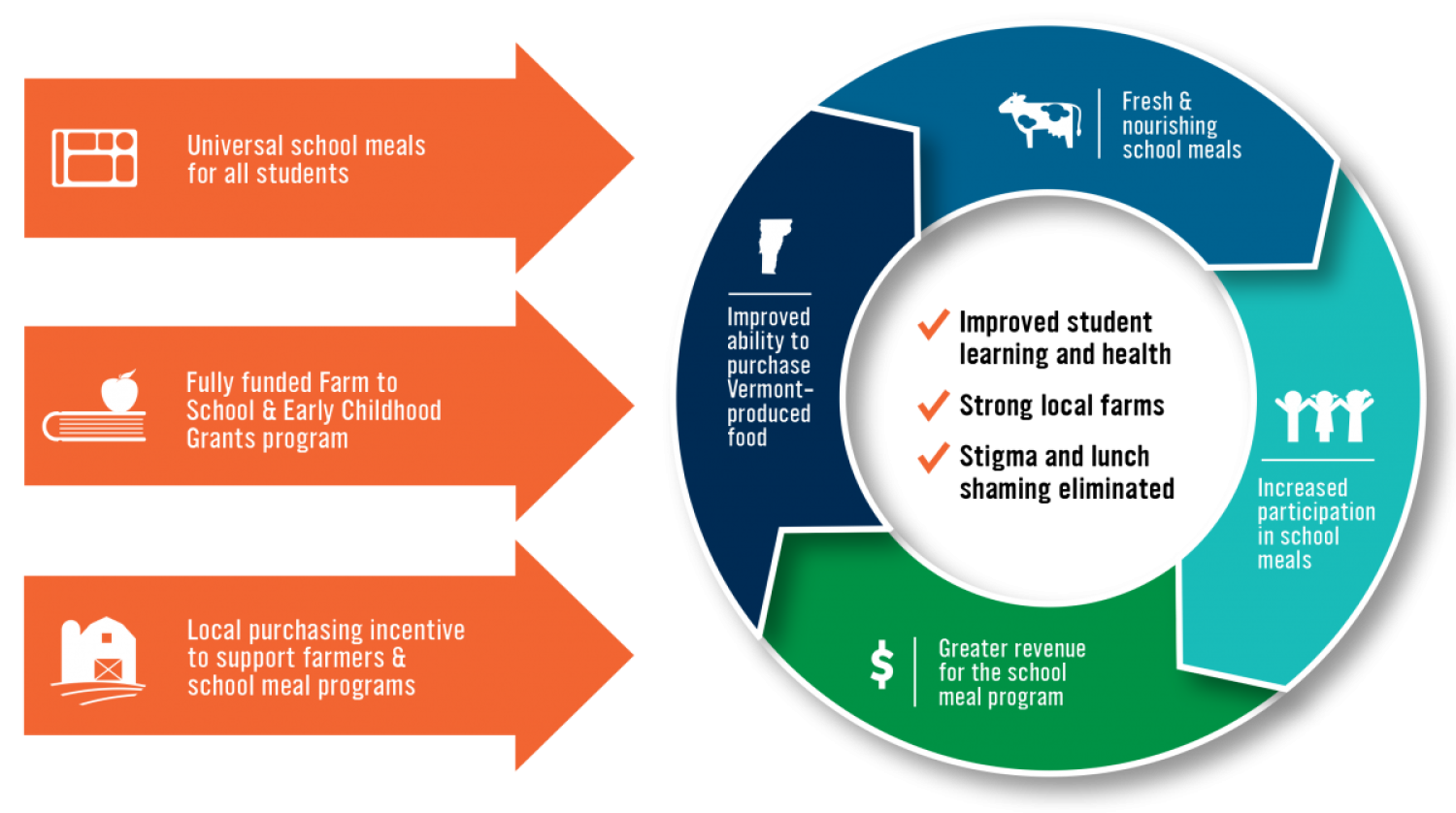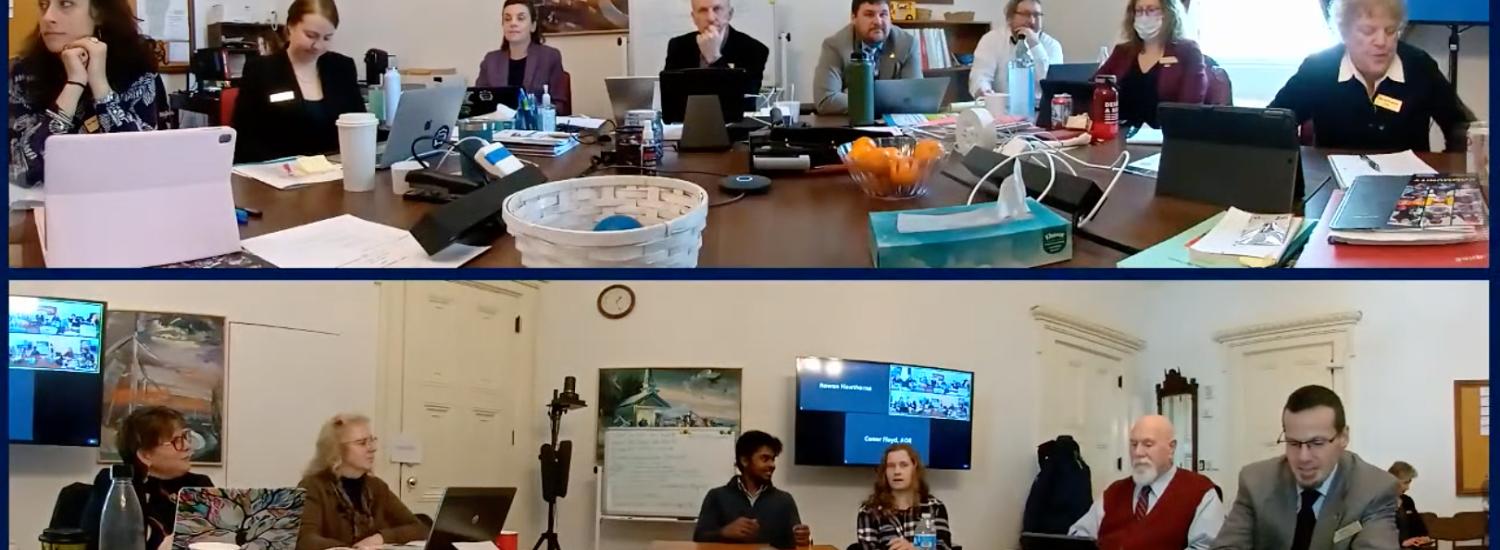“My family immigrated from India, and at the age of three years old, I was in Waterbury, Vermont. I didn’t know too much English, but at school I was able to enjoy meals that were made using local ingredients. I vividly remember eating grilled cheese sandwiches — I had never had grilled cheese before! The bread came from Red Hen Bakery, and we had tomato soup made with local ingredients. I was in preschool, and I was able to tell my parents about all the delicious food I was eating. It was a really formative experience for me, and for a lot of students; the meals were a way for us to all bond.”
–Jeswin Antony, Senior Year Student, Harwood Union High School
Vermont House Education Committee testimony (watch below)
While testifying to the Vermont House Education Committee, Jeswin goes on to recount how farm to school continues to inspire his passions. He planted carrots and zucchini in school garden beds, and saw that food used in the cafeteria to feed himself and his peers. His teachers helped him to explore food systems, composting, and how nutritious, local foods strengthen our bodies and local economies. Now, Jeswin is a leader of his school’s Farm to School Club, and he helps other students explore the ties between our food choices and the health of our planet. This is the opportunity we want all Vermont students to have through robust farm to school programs.
On Wednesday, February 8, the Vermont Farm to School & Early Childhood Network celebrated Farm to School and Early Childhood Awareness Day at the state house. Advocates met with Senate and House Committee members to share how food systems education and local foods in school meals are making a difference to Vermont students, farmers, and communities. We are asking Legislators to fund Vermont's Farm to School and Early Childhood grants and Local Foods Incentive at $500,000 base funding for each.
The Vermont Farm to School & Early Childhood Grant Program
This grant program is a critical connector, bringing farmers and educators together so that our youth can experience local food, have nutritious meals, and learn about where their food comes from. Vermont led the nation when we passed the Rozo McLaughlin Farm to School program back in 2007, supporting schools with both technical assistance, and grant funds. Since then, over 200 grants have gone to schools and early childhood programs.
This grant program builds the structures and capacity for farm to school and early childhood to flourish in Vermont. It supports schools in connecting the 3Cs — Classrooms, Cafeterias, and Communities — providing direct technical assistance to educators, administrators, and nutrition professionals. It supports Vermont teams as participants in Vermont FEED’s nationally recognized Northeast Farm to School Institute, and offers grants to early childhood programs to purchase local foods through CSAs.
“The ability to grow food that is served in our local school is one of the most fulfilling aspects of my life as a farmer… Through our Farm to School Grant, I am able to continue the work of keeping our school garden and the educational experiences going for students. The pure joy and excitement that I have witnessed as students get their hands in the soil to plant seeds, harvest food that they grew from those seeds, and then to consume it in the cafeteria is so special. For students that don't have the opportunity to grow food at their homes, or have not been exposed to growing food before, this experience is truly life-changing.”
–Ashley Fioretti, Owner/Operator of Little Flower Farm,
Wells Springs District Farm to School team educator
Vermont Senate Agriculture Committee testimony (watch below)
The Local Foods Incentive Program
This program offers districts and supervisory unions financial support for feeding more Vermont kids with fresh local food and directing more dollars to Vermont farmers. Schools in Vermont spent approximately $20 million dollars on food to provide approximately 17 million meals to Vermont kids in the 2021-22 school year. School nutrition professionals want to buy more local foods but, with little more than a dollar to spend per plate, they lack sufficient funds to do so on a meaningful scale. This Incentive provides school nutrition programs with financial resources based on how much local food they purchase, encouraging and making it more possible for them to put Vermont farmers and producers first.
Already, in just the second year of the program, 31 of Vermont’s 51 School Food Authorities — that’s 60% of the SFAs in the state — have participated and are adjusting more of their spending from commodity foods to local foods.
“The Local Foods Incentive Grant has caused a major shift in how school food directors approach their menu planning… [It] has had a deep and immediate impact on many Vermont School Food Authorities. Our efforts to reimagine school food purchasing to maximize local products are ongoing. What is clear is that the Local Foods Incentive Grant is working, and that more and more school food dollars are being spent in Vermont as a direct result of it.”
–Jim Birmingham, Director of Nutrition Services, Montpelier Roxbury Public Schools
Vermont Senate Agriculture Committee testimony (watch below)
"Local products being served in school cafeterias creates ample opportunities for connection between students and their local food system. It also opens up new wholesale markets for our local producers… Green Mountain Farm Direct saw its overall sales to school customers grow by 25% between the 2020-2021 to 2021-2022 school years. All 52 of our Vermont-based farmers and producers were directly benefited by this sales increase, but it was especially impactful to our small-scale vegetable growers like Joe's Brook Farm in St. Johnsbury whose sales to schools more than tripled in that time period, Heartwood Farm in South Albany whose school sales quadrupled, and West Farm in Jeffersonville whose school sales also quadrupled. We know that these meaningful increases were directly supported by the Local Foods Incentive Program, which empowered schools to reinvest their budgets into the local food economy."
– Becca Perrin
Food Hub Account Manager Green Mountain Farm Direct (watch below)
The Virtuous Cycle: The Amplification of Universal Meals & Farm to School
Vermont’s Farm to School & Early Childhood Grant Program, Local Foods Incentive Program, and Universal School Meals work together to create powerful change. Farm to school in Vermont integrates food access, food education and local purchasing, so that while we are providing our children critical nutrition, they are understanding what that food does for the health of their bodies and their communities. This benefits our local farmers and builds healthy habits and a connection to Vermont foods for a lifetime.
We call this the “virtuous cycle” of farm to school: farm to school and Universal Meals increases participation in school meals, which improves revenues in the program which allows more local purchasing, leading to more participation.

